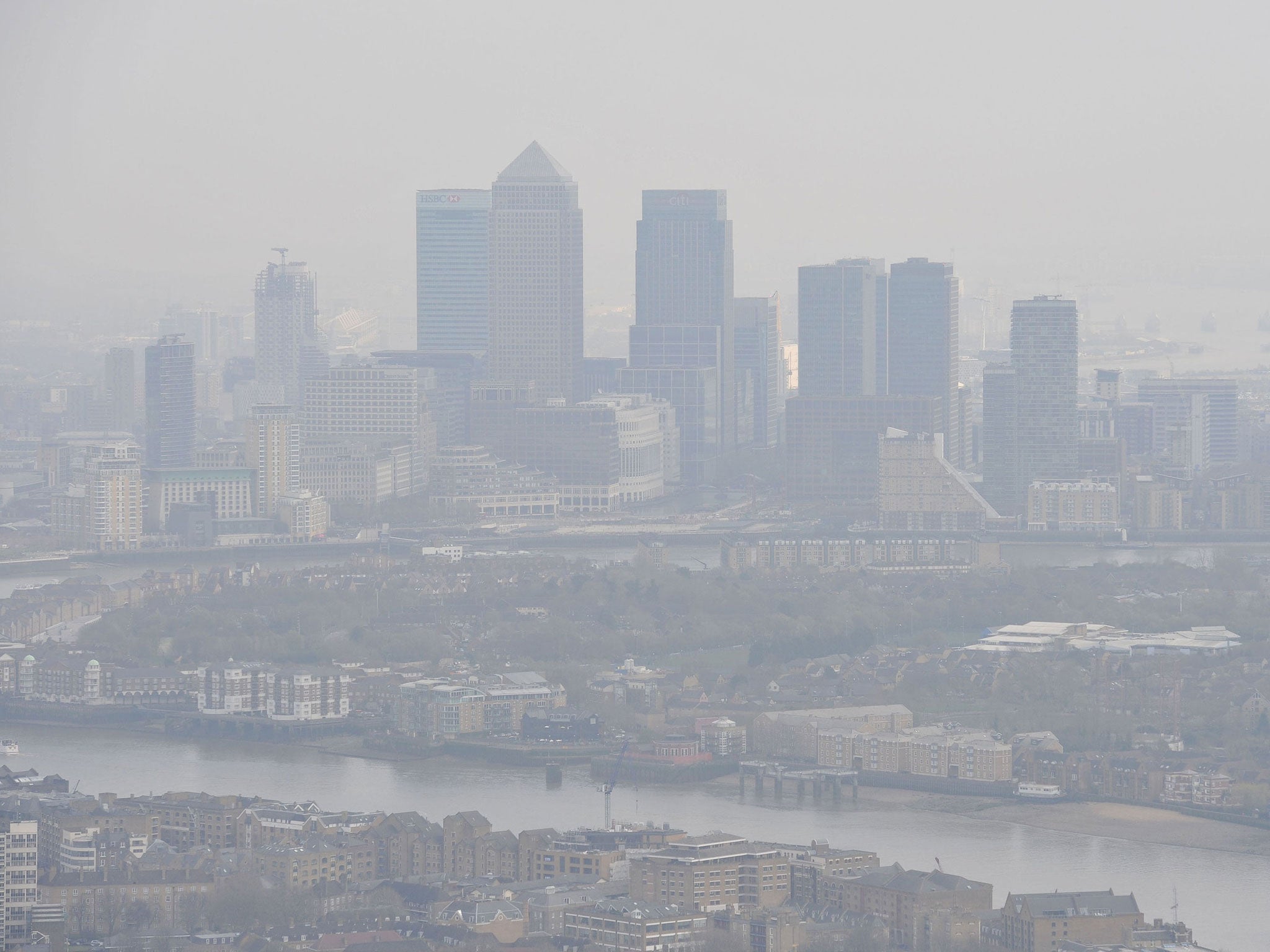Government’s 'inadequate' air pollution strategy fails to tackle car and lorry emissions, warn campaigners
‘While thousands of people are dying early from air pollution the government has postured and prevaricated on air pollution,’ Green MP Caroline Lucas says

The government’s plan to cut air pollution lacks concrete proposals to tackle the problem and fails to address the main source of illegal emissions in towns and cities: cars and lorries.
That is the view of green campaigners, who have warned that ministers’ “inadequate” proposals were shifting the responsibility to local government to tackle a public health crisis claiming 50,000 lives in the UK each year, without saying where the money would come from.
Greenpeace said there was a “transport-shaped hole” in the proposals and urged the government to offer more than just “good intentions”.
Caroline Lucas, co-leader of the Green Party, said the plans were “underwhelming” and the equivalent of “’taking a water pistol to a wildfire”.
Under the clean air strategy, unveiled on Tuesday, the government will introduce legislation to create a new legal air quality framework and give local government new powers to take action.
Ministers have promised to stop 8,000 tonnes of harmful particulate matter from entering the atmosphere each year by banning the dirtiest domestic fuels. Meanwhile ammonia emissions from farmers will be tackled and research will be undertaken to develop new standards for tyres and brake pads to address toxic emissions of microplastics.
A new public messaging system will also be set up to warn people about spikes in poor air quality.
Paul Morozzo, clean air campaigner at Greenpeace, said: “New primary legislation on air quality is much needed. Alongside the new commitment on reducing particulate pollution the government’s new strategy is at least demonstrating the right intention.
“But we need more than good intentions. Once again it looks like local authorities are being handed responsibility without the clarity on where the resources will come from.
“There’s a transport-shaped hole in what we’ve seen of this strategy so far.”
The worst countries in the world for air pollution deaths
Show all 10The new plan comes as the European Commission is taking the British Government to court for breaching EU air quality rules.
The EU’s environment commissioner, Karmenu Vella, said Britain had broken limits on levels of health-damaging nitrogen dioxide (NO2) and failed to provide “credible, effective and timely” plans to cut pollution.
In a separate High Court case in February, a judge ruled the Government’s plans to tackle air pollution were “seriously flawed” and “unlawful”.
Mr Morozzo added: “To be a proper clean air strategy it would need concrete plans on clean air zones to tackle dangerous pollution from diesel cars, yet there’s no detail following the government’s latest ticking off from the High Court.
“Further, to achieve clean air in the UK we have to get diesel cars off our roads as fast as we can. To get us on the right tracks now the government must bring forwards the ban on petrol and diesel cars by a decade to 2030.”
More than 50,000 people die from pollution each year in the UK, according to a report in The Lancet.
Levels of harmful nitrogen dioxide air pollution in the UK have broken legal limits every year since 2010 while 90 per cent of the UK’s population lives in areas where levels of particulate air pollution exceed World Health Organisation limits.
MPs also attacked the plans. Geraint Davies, chair of the All-Party Parliamentary Group for Air Pollution, criticised the proposals as “inadequate and without the focus, priority and resources to meet the challenge of mass premature deaths from air pollution”.
He said: “Michael Gove [the environment secretary] is not taking the crisis seriously. He knows that, if we leave the EU, safeguards against toxic levels of air pollution will no longer be in place.”
Green MP Ms Lucas accused the government of having “postured and prevaricated on air pollution” while thousands of people died prematurely as a result of emissions.
“The details of this plan look extremely underwhelming,” she said.
“It fails to back up their bold claims with any cash – meaning that hard-pressed councils will struggle to implement new strategies.
“Even worse, though, is the utter failure of this government to stand up to the motor lobby – and its continued promotion of private car travel, despite the huge impacts this has on our health.”
And ClientEarth’s James Thornton said: “While the government’s focus on air quality from different sources is welcome, road transport is still the main source of illegal air pollution in our towns and cities.”
The government will publish a separate plan on how it will reduce emissions from vehicles shortly.
Mr Gove said the plan set out “comprehensive action required across all parts of government to improve air quality”.
He claimed air quality had “improved significantly since 2010”, but admitted it was still “making people ill, shortening lives and damaging our economy and environment”.
Mr Gove added: “Government cannot act alone in tackling air pollution. Our strategy sets out how we will work with businesses, farmers, industry and households to develop innovative new solutions to reduce emissions.
“It also highlights how we can all take action and playing an important role in cleaning up our air.”
Subscribe to Independent Premium to bookmark this article
Want to bookmark your favourite articles and stories to read or reference later? Start your Independent Premium subscription today.

Join our commenting forum
Join thought-provoking conversations, follow other Independent readers and see their replies